Key takeaways:
- Understanding various fees, including service, transaction, and hidden fees, is crucial for effective financial planning and avoiding unexpected expenses.
- Being proactive in negotiating fees and shopping around for services can lead to significant savings and better deals.
- Regularly evaluating the value of fees in relation to the benefits received can help manage your budget and improve financial decision-making.
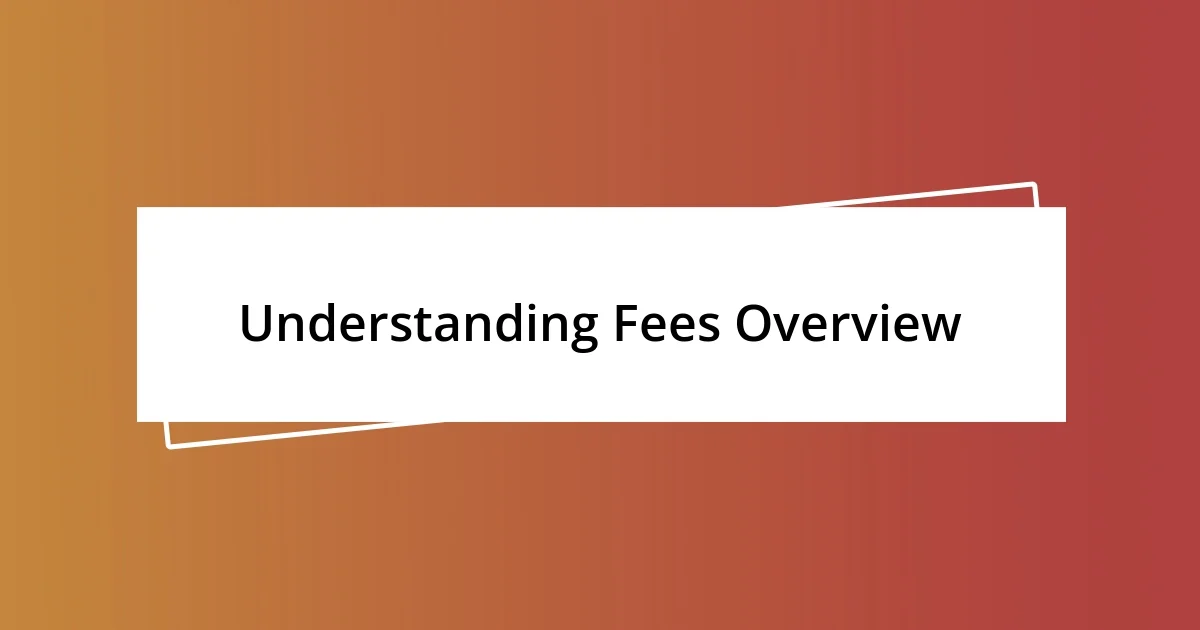
Understanding Fees Overview
When I first dived into the world of fees, I felt overwhelmed by the sheer variety. There are administrative fees, processing fees, and service fees—each can sneak up on you. Have you ever wondered why certain fees seem to appear out of nowhere? Understanding the different types is crucial for anyone navigating financial decisions.
I remember a time when I got hit with unexpected fees in a subscription service. It felt like I’d been both blindsided and misled. This experience taught me that fees can dramatically impact your overall budget and financial planning. It’s pivotal to ask questions and clarify what you’re getting into before you commit.
One of the most eye-opening revelations from my explorations is how fees can vary based on where you’re getting your services. For instance, did you know that banks can have wildly different fee structures? This highlights the importance of shopping around and reading fine print. Taking note of these differences can save you a considerable amount of money in the long run. Remember, being informed is empowering!
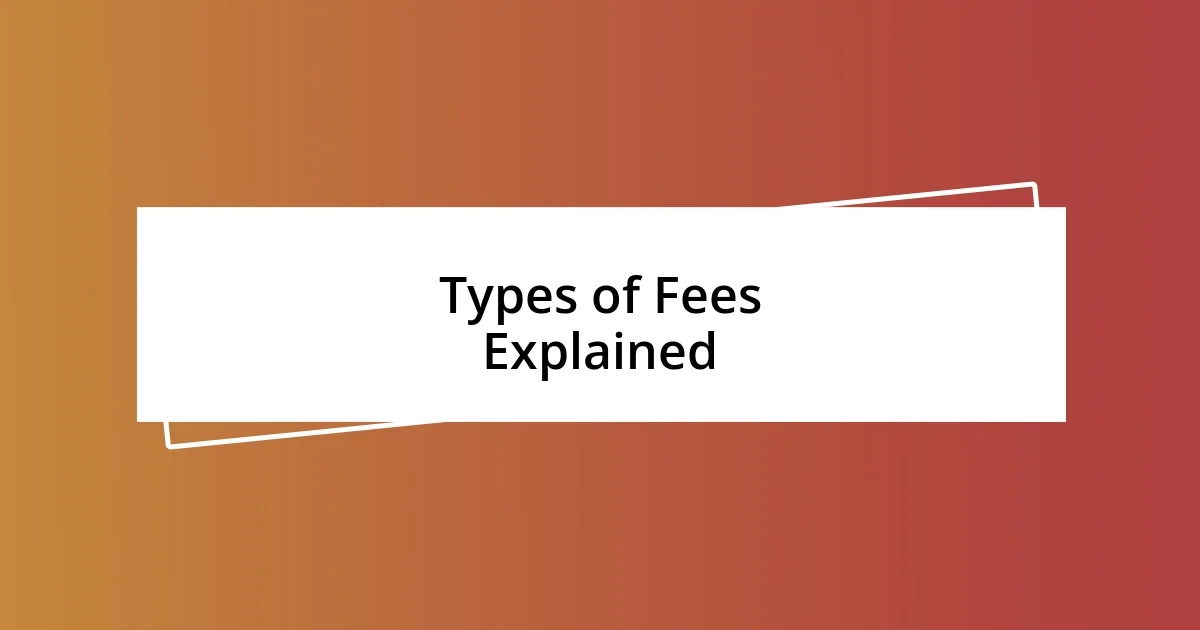
Types of Fees Explained
There’s a world of fees out there, each with its own flavor and purpose. I’ve encountered all kinds—ranging from late payment fees that hit like a surprise bill to your first credit card’s annual fees that felt like a rite of passage. It’s easy to overlook these fees until they impact your wallet, which is why understanding them is so important.
Here are some common types of fees you might face:
- Service Fees: Charged for specific services, like account maintenance or equipment rental.
- Transaction Fees: Applied every time you make a withdrawal or purchase, often seen with ATMs or credit cards.
- Late Payment Fees: Penalties for missing payment deadlines, which can quickly add up.
- Annual Fees: Charged yearly for certain credit cards or memberships, sometimes just for the privilege of having the account.
- Processing Fees: Frequently attached to online transactions or applications, covering handling costs.
Knowing these can save you frustration down the line. I recall almost being floored by an annual fee on a credit card, thinking it was all just for the perks—until I realized I hadn’t really used them. Understanding these nuances can transform your financial habits, putting you in control.

Hidden Fees to Avoid
I can’t stress enough the importance of being aware of hidden fees that can gnaw away at your budget. For example, one time, I signed up for a gym membership only to discover a hefty initiation fee buried in the fine print. It struck me as unfair—like an unexpected hurdle I didn’t see coming. This experience underscored the necessity of reading every line before signing anything; it’s not just about the monthly rate.
Another hidden fee I learned to watch out for is the balance transfer fee. After transferring a balance to avoid high interest on a credit card, I felt clever at first. However, the 3% fee on the amount transferred felt like a punch to the gut. This incident reminded me that sometimes, saving money in the long run can come with surprising immediate costs. Always ask about fees when making decisions—it might change your entire approach to finances.
Lastly, I’ve seen how foreign transaction fees can sneak up on travelers. I once went abroad, thrilled to explore new places while intending to pay with my credit card. It wasn’t until I got home that I realized I had racked up fees for every purchase made outside my home country. The excitement of traveling can quickly turn sour when you’re hit with extra charges. Researching foreign fees ahead of time can help maintain that blissful travel experience!
| Hidden Fee | Description |
|---|---|
| Initiation Fee | Charged when starting a service, like a gym membership. |
| Balance Transfer Fee | A percentage charge applied when transferring balances between accounts. |
| Foreign Transaction Fee | Fees incurred when making purchases in a foreign currency. |
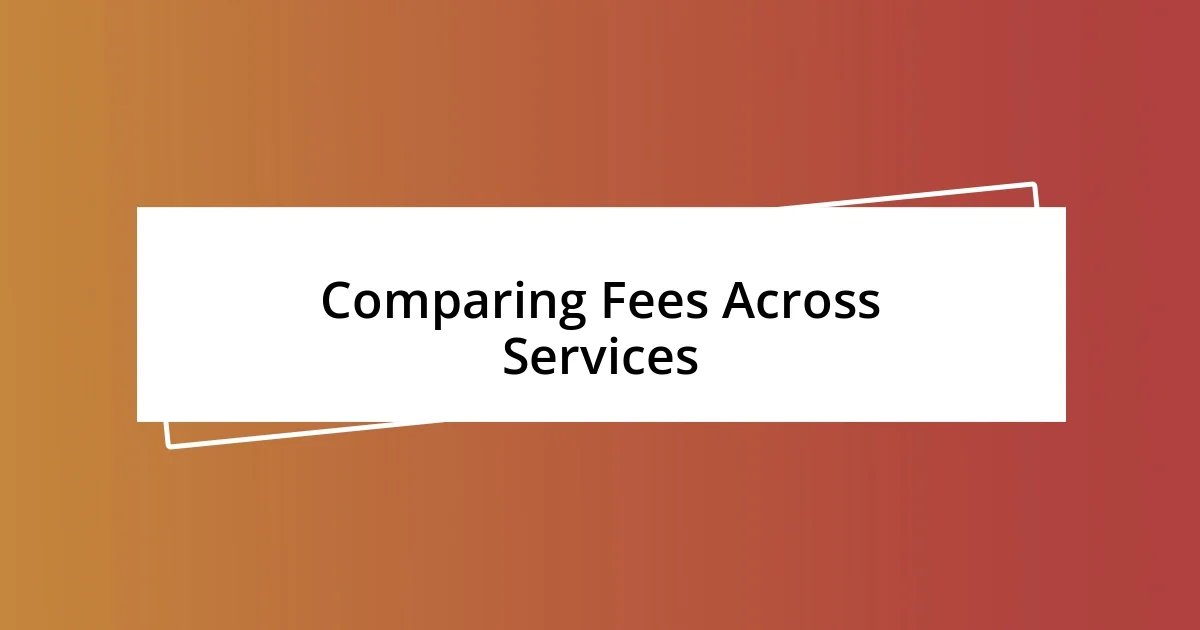
Comparing Fees Across Services
When comparing fees across various services, I’ve often found myself astonished by how different they can be even for the same type of service. For instance, I once jumped into a food delivery subscription, only to discover that one competitor charged a monthly fee while another offered a pay-per-order model with higher individual fees. This left me questioning—is the convenience really worth the extra cost? It’s essential to weigh not just the base fees, but also how they accumulate over time.
In my experience, hidden charges can be lurking behind every service option. I remember trying to book a hotel during a busy season only to realize that the seemingly charming nightly rate didn’t include “resort fees.” Those fees not only altered my budget but also shifted my entire perception of whether that hotel was worth the stay. Have you ever faced similar surprises? Trust me, a bit of research can unveil significant differences and help prevent that uneasy feeling of regret.
Lastly, it’s fascinating how fees fluctuate across similar services based on geographical locations. I recently had to choose between two streaming services. One had a lower monthly fee, but living in a different country meant I was charged more than locals. I began to wonder—does that extra expense reflect the service quality, or simply the company’s strategy to maximize profit? Taking the time to compare not just the fees, but also the value they offer can save you money and enhance your overall experience.

Strategies to Minimize Fees
To minimize fees, I’ve found that being proactive can make a big difference. For instance, when I realized that my bank’s account maintenance fees were eating away at my savings, I switched to an online bank offering no monthly fees. It felt liberating to know my money could stay intact rather than lining someone else’s pockets!
Another strategy I’ve successfully used is to negotiate fees directly. I remember when my cable provider raised my rates; instead of accepting it, I called to discuss my options. After a little back and forth, they offered me a better plan that saved me quite a chunk of change. It made me think—how often do we overlook the power of simply asking?
Lastly, consider setting alerts for any services that charge a fee for late payments. In one instance, I missed a payment deadline, and the resulting fee felt like a punch to the stomach. Now, I have automatic reminders set up, keeping me on track and ensuring I don’t pay extra for forgetfulness. This simple step has saved me not just money but also the stress of cramming in last-minute payments.
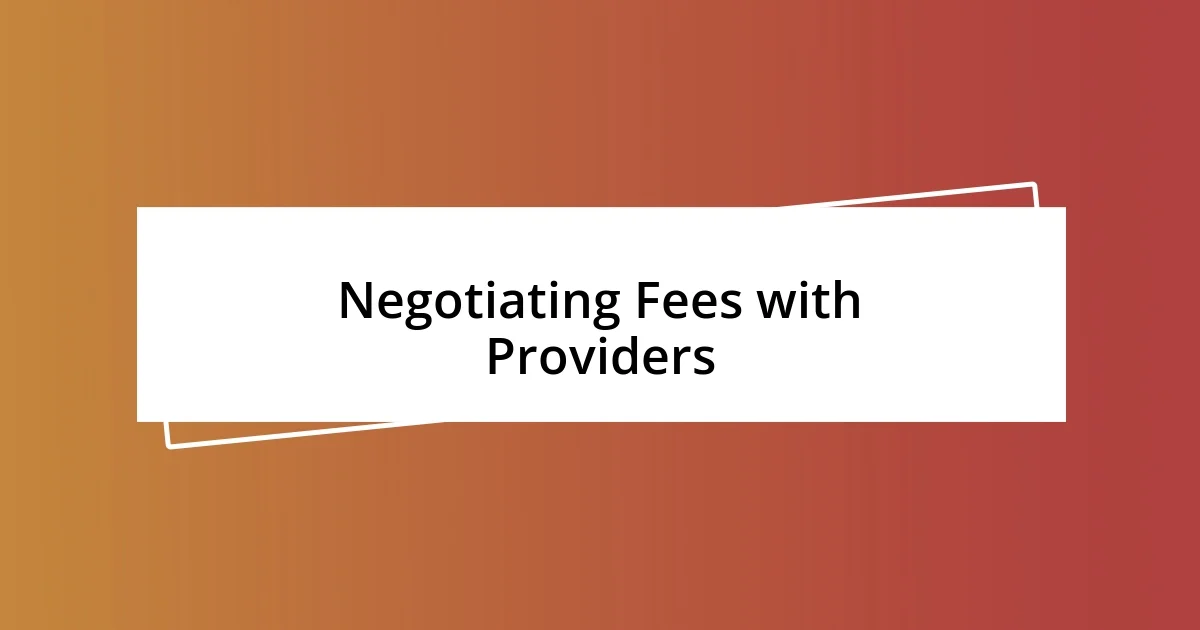
Negotiating Fees with Providers
Negotiating fees with providers can feel daunting, but I’ve learned that it often leads to surprising outcomes. Several years ago, I was about to sign a contract for a home warranty service. I felt that the quoted fee was on the high side, so I figured it couldn’t hurt to ask for a discount. To my surprise, not only did they offer me a lower rate, but they also included additional coverage for no extra charge. Have you ever found yourself hesitating to voice your concerns? You might be missing out on opportunities to save money!
I’ve also discovered that timing can be crucial when it comes to negotiating fees. During one of my routine calls to renew my gym membership, I mentioned that I was considering other options. The manager immediately offered me a much lower rate than what I was previously paying. It made me realize that sometimes all it takes is a simple conversation to reveal hidden flexibility in provider fees. Are your loyalties preventing you from securing a better deal?
Lastly, the right approach matters. While negotiating my health insurance premiums last year, I politely pointed out how long I’ve been a loyal customer and asked if they could match the premium rates of competitors. Surprisingly, they didn’t just reduce my fee; they also upgraded my coverage package. It left me feeling valued and reinforced my belief that effective negotiation is often built on a foundation of respect and understanding. How might your life change if you embraced this practice?
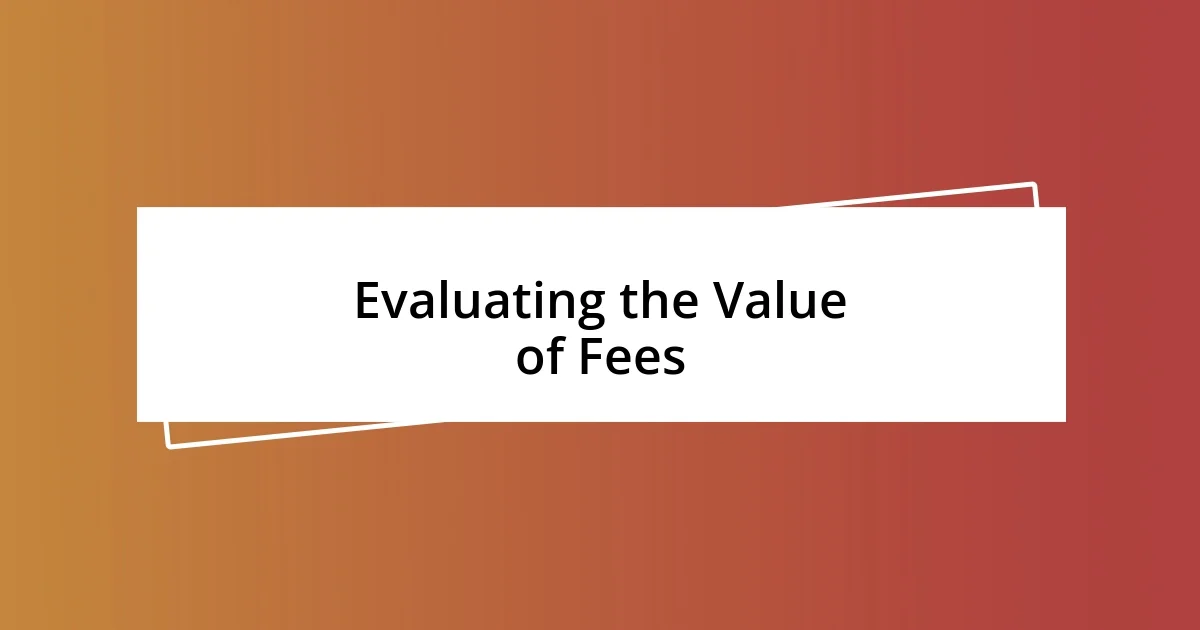
Evaluating the Value of Fees
Evaluating fees can feel like navigating a maze, but it’s essential for truly understanding what you’re paying for. A few years back, I reviewed my subscription services and discovered some I rarely used. In that moment of clarity, I realized that holding onto these services without knowing their real value was draining my wallet. Have you ever felt like you’re paying for conveniences that don’t really serve you?
When assessing fees, it’s crucial to differentiate between necessary costs and those that would feel like a splurge if they weren’t bundled with something valuable. I once paid an annual fee for a premium streaming service, thinking it was worth it for the exclusive content. Once I finally cancelled and explored free alternatives, I found that I was missing out on plenty of great options without the extra expense. What hidden treasures might you find by reevaluating your current commitments?
Understanding the bigger picture can also empower your financial decisions. I remember discussing management fees with an investment advisor who explained the long-term impact of these charges on my portfolio. It hit home for me when I realized that 1% over time could mean significantly reduced returns. When you assess fees, think beyond the immediate cost—what does it mean for your financial future? Being informed gives you the power to make choices that align with your life goals.














